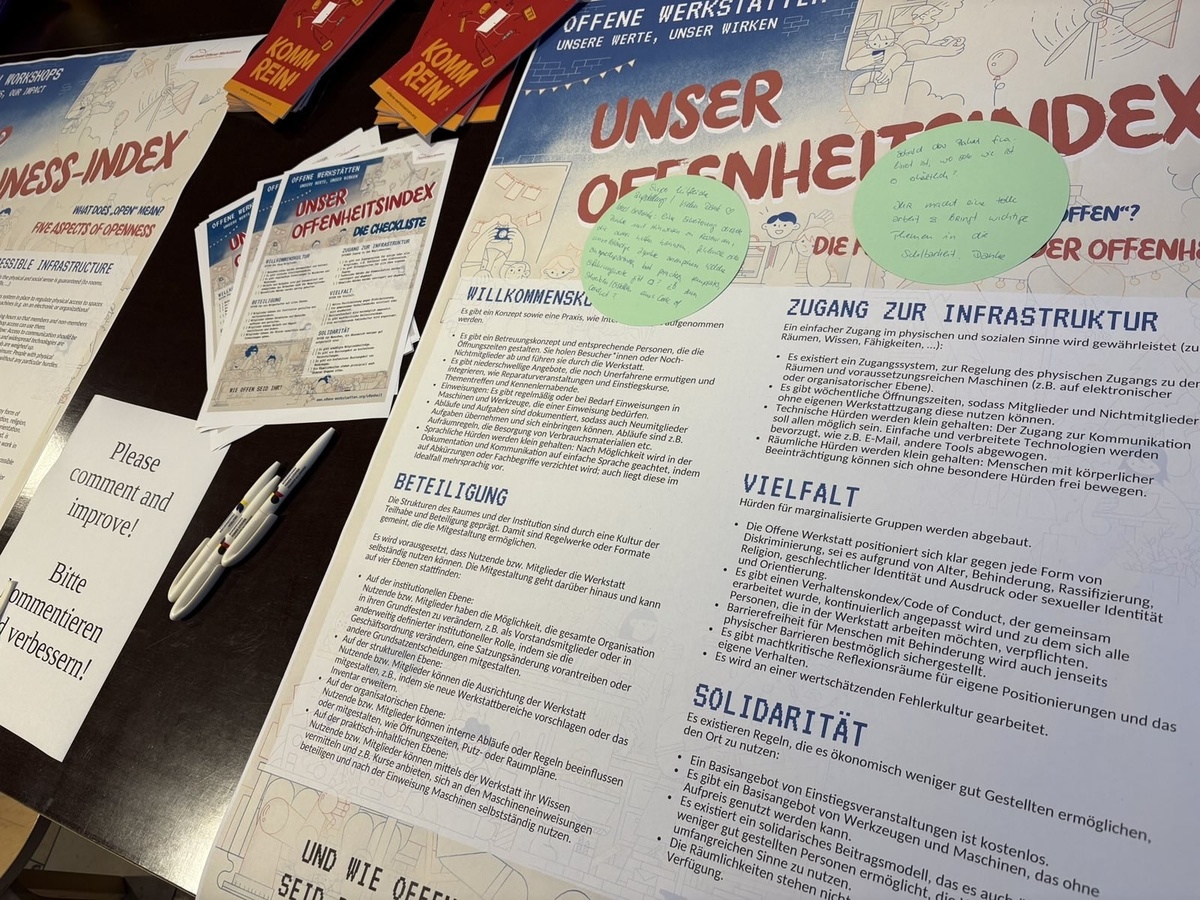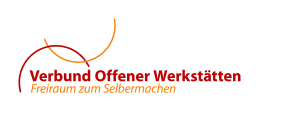Openness index

What is 'open' about open workshops and how do we get there? This index is designed to help you open up your workshops.
Criterion 1: Participation
The structures of the space and the institution are characterised by a culture of participation and involvement. This refers to a set of rules or formats that enable co-design. It is assumed that users or members can use the workshop independently. Co-creation goes beyond this and can take place at four levels:
- At the institutional level: Users or members have the opportunity to change the foundations of the whole organisation, e.g. as board members or in other defined institutional roles, by changing the rules of procedure, lobbying for a change in the constitution or helping to shape other fundamental decisions.
- At the structural level: Users and members can help shape the direction of the workshop, for example by suggesting new workshop areas or expanding the inventory.
- At the organisational level: Users or members can influence or contribute to internal processes or rules, such as opening hours, cleaning or room schedules.
- At the practical level: Users and members can use the workshop to share their knowledge and offer courses, such as attending machine training and using machines independently after training.
Criterion 2: Access to infrastructure
Easy physical and social access is guaranteed (to spaces, knowledge, skills, ...):
- An access system is in place to regulate physical access to rooms and equipment (e.g. at an electronic or organisational level).
- There are weekly opening hours so that members and non-members without their own workshop access can use them.
- Technical barriers are kept to a minimum: Access to communication should be available to everyone. Simple and widespread technologies, such as email, are preferred, while other tools are weighed up.
- Spatial barriers are kept to a minimum: People with physical disabilities can move around freely without any particular obstacles.
Criterion 3: Welcoming culture
There is a concept and a practice of how to welcome interested parties.
- Linguistic barriers are kept to a minimum: Wherever possible, documentation and communications are written in simple language, avoiding abbreviations and jargon, and ideally available in multiple languages.
- Procedures and tasks are documented so that new members can take on tasks and get involved. Procedures include, for example, tidying up rules, getting supplies, etc.
- There are low-threshold opportunities to encourage and integrate those who are still inexperienced, such as repair sessions and introductory courses, themed meetings and get-to-know-you evenings.
- Instruction: Instruction is given regularly or as needed on machines and tools that require instruction.
- There is a support concept and people who organise the opening hours. They meet visitors or non-members and guide them through the workshop.
Criterion 4: Diversity
Barriers for marginalised groups are removed.
- The Open Workshop takes a clear stance against all forms of discrimination, whether based on age, disability, racialisation, religion, gender identity and expression or sexual identity and orientation.
- There is a code of conduct that has been jointly developed and is constantly updated, to which all those who wish to work in the workshop must adhere.
- Accessibility for people with disabilities is also maximised beyond physical barriers.
- There are spaces for reflection on one's own positioning and behaviour that are critical of power.
- We are working on an appreciative failure culture.
Criterion 5: Solidarity
There are rules that allow the less well-off to use the place:
- A basic range of introductory sessions is free of charge.
- There is a basic range of tools and machinery that can be used at no extra cost.
- There is a solidarity-based contribution model that allows less well-off people to make full use of the workshop.
- There is a basic range of tools and machinery that can be used at no extra cost.
- There is a solidarity-based contribution model that allows less well-off people to make full use of the workshop.
- The space is not just for an exclusive group.
Print it
Here you can find the print files for the versions of the Openness Index:
